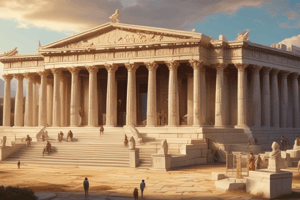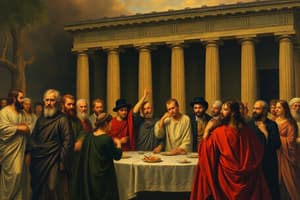Podcast
Questions and Answers
According to Josiah Ober, due to what did the Athenian elite actually rule?
According to Josiah Ober, due to what did the Athenian elite actually rule?
The Athenian elite did not actually rule. Instead, reciprocity achieved through discourse was the method used by the elites to maintain their power and influence.
When did Ober begin work on the book that was first published in 1989 by Princeton University Press, as Mass and Elite in Democratic Athens?
When did Ober begin work on the book that was first published in 1989 by Princeton University Press, as Mass and Elite in Democratic Athens?
Ober began work on the book in the early 1980s.
What was Ober's dissertation topic?
What was Ober's dissertation topic?
Ober's dissertation was on the topic of Athenian defense policy after the Peloponnesian war.
According to Ober, on what topic did the original idea for a book concerning depictions of elite and non-elite attributes in Athenian rhetoric of the late fifth and fourth centuries BCE arise?
According to Ober, on what topic did the original idea for a book concerning depictions of elite and non-elite attributes in Athenian rhetoric of the late fifth and fourth centuries BCE arise?
The core of the argument Ober provides in Mass and Elite in Democratic Athens is based on a model of civic ideology and practices of citizenship that he asserts gave Athenians reasons to cooperate across lines that were often considered to be divides.
The core of the argument Ober provides in Mass and Elite in Democratic Athens is based on a model of civic ideology and practices of citizenship that he asserts gave Athenians reasons to cooperate across lines that were often considered to be divides.
Ober argues that the elite in Athens were demonstrably less powerful than the elite in other comparable ancient societies.
Ober argues that the elite in Athens were demonstrably less powerful than the elite in other comparable ancient societies.
Ober's book Mass and Elite in Democratic Athens was first published in what year?
Ober's book Mass and Elite in Democratic Athens was first published in what year?
Ober attributes his success to what in the context of his scholarly work?
Ober attributes his success to what in the context of his scholarly work?
Briefly summarize Ober's theoretical framework for analyzing the relationship between mass and elite in classical Athens.
Briefly summarize Ober's theoretical framework for analyzing the relationship between mass and elite in classical Athens.
How does Ober define the term ‘elite’ in the context of Athenian society?
How does Ober define the term ‘elite’ in the context of Athenian society?
Flashcards
Mass and Elite in the Greek and Roman Worlds
Mass and Elite in the Greek and Roman Worlds
The study of the interaction between the mass population and the elite in Ancient Greece and Rome.
Mass and Elite in Democratic Athens
Mass and Elite in Democratic Athens
A work by Josiah Ober that explores the relationship between the mass population and the elite in Ancient Athens.
Democracy Ancient and Modern
Democracy Ancient and Modern
A book by Josiah Ober that examines the relationship between democracy in the ancient world and in modern times.
Polloi
Polloi
Signup and view all the flashcards
Olighoi
Olighoi
Signup and view all the flashcards
Aporoi
Aporoi
Signup and view all the flashcards
Plousioi
Plousioi
Signup and view all the flashcards
Gnorimoi
Gnorimoi
Signup and view all the flashcards
Plethos
Plethos
Signup and view all the flashcards
Mesos
Mesos
Signup and view all the flashcards
The Athenian Elite
The Athenian Elite
Signup and view all the flashcards
The Athenian Mass
The Athenian Mass
Signup and view all the flashcards
Did the Athenian Elite Rule?
Did the Athenian Elite Rule?
Signup and view all the flashcards
Mechanisms for Managing Power
Mechanisms for Managing Power
Signup and view all the flashcards
Factors Beyond the Elite
Factors Beyond the Elite
Signup and view all the flashcards
The Roman Revolution
The Roman Revolution
Signup and view all the flashcards
Transformation in Roman Society
Transformation in Roman Society
Signup and view all the flashcards
The Roman Mass
The Roman Mass
Signup and view all the flashcards
The Roman Elite
The Roman Elite
Signup and view all the flashcards
Social and Political Change in Rome
Social and Political Change in Rome
Signup and view all the flashcards
Demos
Demos
Signup and view all the flashcards
Limitations of Elite Power
Limitations of Elite Power
Signup and view all the flashcards
Eutaxia
Eutaxia
Signup and view all the flashcards
Mechanisms for Elite Control
Mechanisms for Elite Control
Signup and view all the flashcards
Legitimacy and Justice of Elite Rule
Legitimacy and Justice of Elite Rule
Signup and view all the flashcards
Complex Elite-Mass Relations
Complex Elite-Mass Relations
Signup and view all the flashcards
Insights from Studying Elite-Mass Relations
Insights from Studying Elite-Mass Relations
Signup and view all the flashcards
Study Notes
Mass and Elite Revisited
-
The author, Josiah Ober, discusses the concept of "mass and elite" in ancient Athenian democracy, revisited in light of 21st-century scholarship.
-
Initially, the author's focus was on Athenian rhetoric and defense policy in the late 5th and 4th centuries BCE.
-
His dissertation, supervised by Chester Starr, explored Athenian defense policy after the Peloponnesian War, leading to the concept of mass and elite.
-
The author was first inspired by apparent contradictions in the speeches of Demosthenes.
-
His initial research focused on the relationship between the Athenian elite and the masses.
-
The author's original book, Mass and Elite in Democratic Athens (1989), sought to understand how democratic Athens was able to maintain stability amidst challenges.
-
The author highlights the importance of political sociology, particularly the work of Moses Finley, in understanding ancient Greek democracy.
-
The author's project evolved to encompass political sociology, analyzing the complex interaction of mass and elite in Athenian society.
-
He sought to bridge the gap between elite discourse and mass action.
-
The author's work argues that Athenian stability stemmed from a reciprocal exchange between elites and the masses.
-
The author's research explored the interplay of public discourse, ideology, and social behavior in Athenian democracy suggesting that a shared civic discourse reconciled elite and mass interests.
-
The study's conclusion underscores the relevance of "mass and elite" as a concept in understanding social and political dynamics, even in modern contexts.
Further Considerations
-
The author suggests that ancient Athenian society was not binary, but rather diverse in wealth and resources.
-
Income distribution models in ancient Athens were more akin to a skewed distribution, not a simple dichotomy.
-
Elite influence was not absolute, but bound by a shared civic ideology and popular acceptance.
-
The author's research touches upon the relationship between elites and the masses in various historical contexts.
Key Entities
- Richard Evans (ed.)
- Josiah Ober
- Mass and Elite in Democratic Athens (1989)
- Mass and Elite in the Greek and Roman Worlds
- Demosthenes
- Chester Starr
Studying That Suits You
Use AI to generate personalized quizzes and flashcards to suit your learning preferences.




